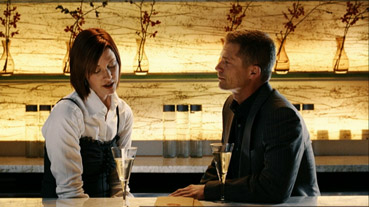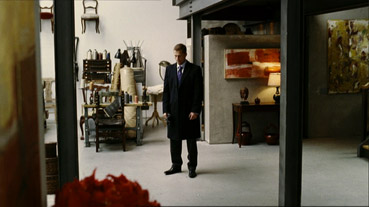|
There's no doubt that Til Schweiger makes for a slightly odd leading man in One Way. Playing an American advertising executive, nobody in the film ever mentions the fact that he speaks with a heavy German accent. As one of Germany's most charismatic performers, his presence at the centre of the piece certainly makes sense; even more so considering his executive producer's credit. However his lead role in a way becomes emblematic of the some of the contradictions undermining the film. This is a film set in America but with very little about it that could be called American.
Schweiger plays Eddie Schneider, creative director for a successful advertising agency who is seemingly set for life with an engagement to Judy (Stephanie Von Pfeftan), the boss's daughter. Things become complicated when his potential future brother-in-law Anthony (Sebastien Roberts) brutally rapes Eddie's best friend Angelina (Lauren Lee Smith), leading to a labyrinthine spiral of blackmail, deceit, and murder.

One Way is a German-Canadian production directed by Swiss native Reto Salimbeni, set in a wintry New York. This is not a film about New York as much as it is a film about people who happen to live in New York, and to that end Toronto stands in. Even outside of casting a German in an American role, there's an international feel to the film. Salimbeni shoots the city with a stranger's eye, and the aesthetics are the film's most striking element. He avoids the familiar tourist landmarks, even in the authentic aerial shots. One Way strays away from the standard representations of the city. It is made clear through the film's visuals that were not in and of the familiar cinematic New Yorks. This is no Death Wish urban nightmare, neither is it a Sex and the City consumer paradise or a Woody Allen fairytale. There is nowhere in the film that ever feels like a lived-in place, there is no concrete sense of location. As if to hide the inherent foreignness of his lead actor, Salimbeni positions his film in abstract, unplaceable spaces – offices, nightclubs, back alleys that could belong in any city in the world. One Way is a world of stark interiors, trendy minimalist design and postmodern architecture, seen through a wash of greys and blues. Angelic white light floods the frames from inexistent sources, picking out the vacant patterns in the background whilst creating a strange aura round the shapes of characters in the foreground. Faces are always partially silhouetted, half visible in the light that surrounds them. It's beautiful and mesmerizing to watch, and there is something to be said for just languishing in the deliberation of the camera, gliding across glowing bridges and pirouetting above the night cityscape. The visuals really succeed in the portrayal of sexual violence, the sedate approach heightening the characters' vulnerability and danger to terrifying effect.
Unfortunately, the film's script can't seem to match the lofty aesthetics, and much superfluous action seems to been kept in for the sake of the remarkable visuals. One Way is often a very muddled experience, and the minimalist approach is not replicated in the dramatic structure. Scenes frequently run on for too long, the screenplay meanders through episodic second and third acts, never quite delivering the kind of pacing that a plot of this type requires. Characters seem to talk too much, and the somewhat clunky dialogue is full of plot exposition. At one point, a scene in which Angelina orchestrates a revenge on one of her abusers is preceded by nearly ten minutes of rambling threats, pleas and apologies on the part of her former tormentor which are so unfocused and wandering that they appear to be improvised, and detract from the scene's impact. Likewise the story oscillates between two parallel plots, never quite deciding who the main character is. The film appears to be building towards a study of Eddie's self-induced downfall as he traps himself within his own lies and womanizing, climaxing at a court case in which Eddie lies to save his brother-in-law's career. However at the film's midpoint there is a sudden change of focus to the ordeal of rape victim Angelina, and Eddie is all but sidelined. When the focus returns to Eddie it has the feel of returning from an interlude, an effect made all the more heavy by the use of a second court case (in which Eddie again has to chose between career and friendship) for a dramatic finale which ends up feeling like a ‘previously on…' television reprise. It is a confusing and unfocused plot from a script that feels like it is a couple of drafts away from the finished product. The story is not helped by the many unnecessary characters who find themselves given prominent screen time, including Michael Clarke Duncan as a hallucinatory guardian-angel figure to Angelina, whose presence is never properly expanded on or explained.

Schweiger himself copes very well acting in English. He has the profile of a typical American leading man, despite the fact he never attempts an authentic accent. In a way, this is unimportant; Schweigher wraps his lips around the lengthy speeches the script frequently gives him, and brings a roguish charisma to the part. Although the character is slightly underwritten and feckless, offering little in the way of psychological depth, Schweiger fills it out very effectively and with an infectious enthusiasm. The supporting cast succeed despite the rambling script, with Sebastien Roberts particularly effective as the blackmailing rapist Anthony, and Eric Roberts on top form, albeit in a redundant cameo as Eddie's defence lawyer.
One Way makes for a jarring experience. The aesthetics are extremely effective and seductive, radiating efficiency and alienation in a New York that isn't really New York. Ultimately the film's bloated script could have possibly used some more of the tight Hollywood storytelling it rejects, but this is still an intriguing and ambitious project that handles dangerous subject matter to some success.
The picture is anamorphic 1.78:1, a ratio that would normally suggest an HD source, but instead it appears to be a crop from a 2.35:1 original, given that was the ratio on Universal's German DVD release. In other respects the transfer holds up well, the slightly muted colour likely a deliberate decision, while the contrast is solid and the sharpness good, although a couple of notches short of pristine.
The Dolby stereo 2.0 soundtrack is very clear, with some solid bass work on the sound efefcts and music. Again we lose out to the German Universal disc, though, which had a 5.1 surround track.
The disc is devoid of extras save a rather old-fashioned trailer (1:55) that, strangely, portrays the film as a violent thriller. The German trance track that is played over the top is worth a listen. Once again, the German disc wins out here, with an audio commentary, two featurettes and a music video, but the commentary is likely to be in German and there are no English subtitle options.
A could've been. One Way is well worth a watch despite uneven pacing and dialogue problems – the visual style is worth the price of the disk alone, although it would have been nice to see it framed as it was shot. A decent making-of and some crew interviews are sorely missed, though the picture and sound quality are admirable.
|